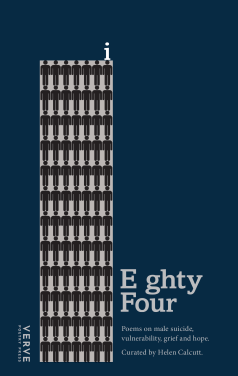Our featured publication for June is Eighty Four: Poems on Male Suicide, Vulnerability, Grief and Hope, curated by Helen Calcutt, published by Verve Poetry Press.
“Eighty Four is a new anthology of poetry on the subject of male suicide in aid of CALM.
Curated by poet Helen Calcutt, the anthology features a host of male and female voices sharing their experiences of suicide, mental health, or grief – from those who have been on the brink of suicide, to those who have lost a loved one, or been moved more generally by the campaign. It is both an uncensored exposure of truths, as well as a celebration of the strength and courage of those willing to write and talk about their experiences, using the power of language to openly address and tackle an issue that directly affects a million people every year.” Verve Poetry Press

A Dream
You were on the river, heading away downstream,
your powerful shoulders working the paddle –
dip, pull, lift, dip, pull – each stoke a perfect slice
through the black water, that gathered and ruckled
about the blade – lift, dip, pull –
as in the time we were on the river together,
that autumn morning of mist drifting up through
the highbanked trees and the fine rain that soaked
our clothes and skin and hair and made us happy.
A good time. The two of us together on the river.
Now you were alone and it was night.
I was leaning on the windowsill, looking out
and if you had turned you would have seen me there,
a ghost face at the glass haunting your leaving.
You did not look back. All your concentration
strained towards the journey you were making
and I was powerless to stop you, just as I was powerless
to turn away from watching. No call of mine
would bring you back. For payment, the river
had taken my voice, and I was forbidden to enter
where you were going.
David Calcutt
The decision room
There’s a deep frost, salt-crisp, and if I lick it
I’ll taste the very end of the night before,
when you shut your front door, went upstairs
to where there was only just enough air left for
one breath and only just enough time to decide.
And somewhere in that pitch-dark space
where your breath finished in your lungs
you shaped the beginning of your end.
It is your pre-jump. Your vault. You step from
your body, two foot from where my bed is now,
without the slightest hope of a second chance ‒
leave it behind like a moon blighted by clouds.
You tugged open every drawer and they stuttered
on rough wooden runners, hung lopsided and you
pulled sweater after sweater, shirt after shirt, until
deciding what to die in became impossible.
It is 5am when the police come. Ice-white fields
aren’t yet disturbed, nothing creaks.
The doorbell’s shrill is a terrible wrong.
I’m thinking about the coldness of morgues
and have so many clothes to keep me warm ‒
a shoddy dropped mess of them, a pulled out,
thrown down, skinless you.
Most times I remember the whole of you, but
sometimes I can’t help remembering how far you fell.
Abegail Morley
An incident with a train
The local news will describe this as an incident with a train,
because no-one wants to read what really happens
when a solitary human being collides with that velocity
of despair. Official statements will be performed as
preformed – with intent to still. Stress the fullness of investigation,
the minimised disruption to your commute. There will
be no dwelling on the life or the death of it. The convulsing
mother, degraded to salt. The junior police officer
fighting back puke, weighing alternative career options
against the chances of promotion and a desk.
The trembling, day-glo railway worker who yells
at the edging crows, fuck off, fuck OFF. Throwing
stones to ward them from the spoils:
it’s hard, even at the best of times,
to look solemn in a hi-vis vest. It’s hard to hold together.
Paul Howarth
Seven Senryu in Memory of Brian Karr Harter (1969-1987)
stepping up to the casket my noisy heartbeat
my reflection huge in the funeral parlor mirror
nearing his gravestone
the letters begin to blur—
January fog
remembering his suicide
winter hardens
the soil
visiting the graves
my legs sink
in deepening snow
remembering his suicide—
……stepping slowly
……across the moonlit bridge
remembering his suicide all these acorns
Carrie Etter
The Eighty Four anthology is available to buy from the Verve Poetry Press website, in aid of CALM.

